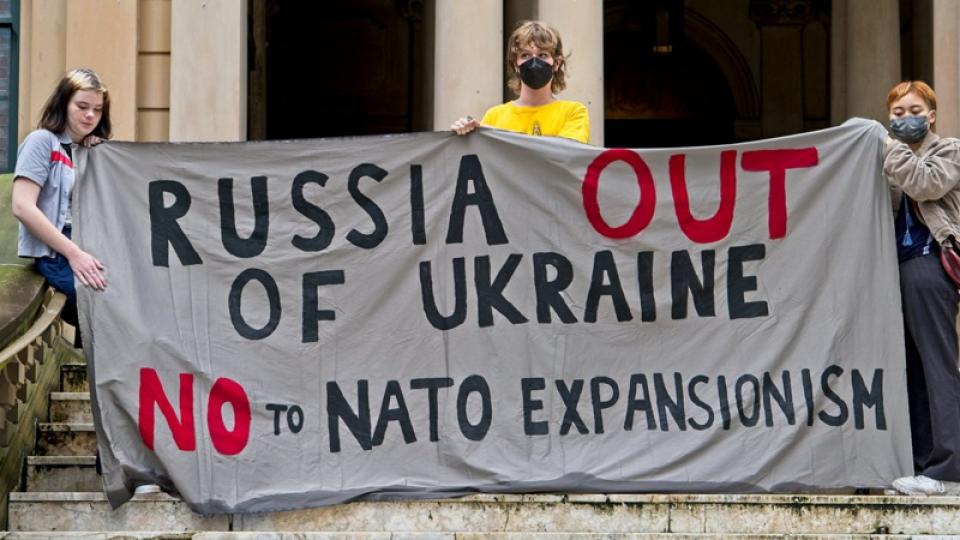War, capitalist media and silencing dissent

If there was any doubt that media neutrality is fake, the Q&A episode in which a questioner was booted out is a stark reminder of the truth.
A question was submitted that dared to question prevailing attitudes. Sasha Gillies-Lekakis was forced to leave the discussion after the host decided he should. Whether the questioner acted wisely is not the issue. He felt he had the right in a democracy to ask a question. How wrong he was.
The behaviour of Q&A and its host Stan Grant was an act of political censorship. But The Age and The Guardian, among others, chose to attack Gillies-Lekakis for attempting to exercise his right to free speech. Matthew Knott in The Sunday Age went so far as to claim a kinship between left and right.
Some elements of the right might see merit in Putin’s behaviour. But the left is calling for Russia to leave Ukraine and for the United States and NATO to cease their interference. Just because socialists refuse to let imperialism and capitalism off the hook, they are now lumped in with the far right.
The Age also denounced author and film-maker John Pilger for daring to say that the US and NATO are acting in a threatening manner.
Censorship, both imposed and self-imposed, goes on at all levels. It evokes the image employed by Emile Zola and, later, by Dalton Trumbo in his Time of the Toad. Zola suggested that to survive a repressive regime you must swallow a live toad each day.
You have to “immunise” yourself against the moral indifference of the society around you; eventually the taste of toad becomes acceptable. Trumbo transferred the symbol to the period of the McCarthy witch-hunts of the early Cold War.
The British Labour Party has just forced 11 of its MPs to swallow their toads. MPs who signed a Stop the War statement were told to withdraw their names or face possible expulsion. Prime Minister Boris Johnson has pronounced that the war is a battle for democracy, but he is yet to criticise Labour for its blatantly anti-democratic order.
One of the more disturbing aspects of the war in Ukraine has been the media uniformity. Dissenting voices are side lined. Anti-war feelings may be expressed, but within strict guidelines. The media has assumed a role that is reminiscent of war reporting in World War I. There is little room for analysis. In its place is propaganda that seeks to demonise.
Political forces, both government and opposition, speak as one. Any criticism of the real culprits in this catastrophe becomes muted to the point of near silence.
The heroic efforts of Russian socialists and peace activists are given scant attention. Every Russian outrage is presented with an accompanying photo of a mother and child, or an anguished face. While the war is wrong and the truth must be told, the fact remains that the media is effectively “embedded” with the combatants of one side.
This is alarming “journalism” and reflects a deeper crisis affecting the entire structure of capitalism. The state exists to support specific class interests. It exists to keep social order, harmony and to keep the economic wheels turning.
The media is one of its more important arms. It is the fourth estate, the protector of democracy, the safeguard against corruption and overt bias — or so we are told.
When critical moments arise, as now, the media becomes more overtly partisan. There is a war, there is the threat of war in our region, there is a crisis in capitalism and there is the existential threat of climate change.
These need to be addressed and people need to be engaged in the debate. But that debate is being shut down, and dissenting voices are being silenced.
Occasionally, the mass media and government spokespeople express concern that alternative news sources may reinforce existing prejudices. But what’s being dished up on a daily basis is designed to reinforce prejudices and limit capacity for independent thought.
Since Russia invaded Ukraine, the state, its political representatives and the media have run a consistent line: condemn Putin but downplay the meddling and provocations by the US and NATO.
US military doctrine speaks of ensuring an international order that “is most conducive to our security and prosperity … and preserve access to markets”. To ensure this happens means there can be no room for embarrassing questions and no dissent.
With such censorship, it becomes easier for governments, capital and imperialism to act with even greater impunity.
The German government has just committed to a game-changing policy shift: it plans to nearly double its military budget. A “special fund” for the military, to lift spending to more than 2% of GDP, will be written into the constitution. It further militarises an already militarised Europe, but this policy shift has hardly been scutinised.
In the Indo-Pacific region, the recent Quad meeting will further intensify the dangerous situation. The war in Ukraine was presented in a way that gave the impression that events there and in Asia were all but identical.
It is so much easier to conflate issues and promote fear when nothing is questioned or analysed: the corporate media is willingly devouring the toad.
There is a crisis before us and it is a crisis of capital. Washington has said that access to markets is its real concern. The public is being told the war is about preserving democracy and freedoms. But when one voice asks just one question in what is supposed to be a democratic forum and is silenced by what we are told is a free and democratic media, we are clearly sailing into dangerous waters.
[William Briggs is a member of Socialist Alliance.]